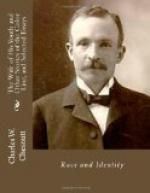Uncle Wellington Braboy was a deeply interested listener. He had heard something of these facts before, but his information had always come in such vague and questionable shape that he had paid little attention to it. He knew that the Yankees had freed the slaves, and that runaway negroes had always gone to the North to seek liberty; any such equality, however, as the visiting brother had depicted, was more than uncle Wellington had ever conceived as actually existing anywhere in the world. At first he felt inclined to doubt the truth of the speaker’s statements; but the cut of his clothes, the eloquence of his language, and the flowing length of his whiskers, were so far superior to anything uncle Wellington had ever met among the colored people of his native State, that he felt irresistibly impelled to the conviction that nothing less than the advantages claimed for the North by the visiting brother could have produced such an exquisite flower of civilization. Any lingering doubts uncle Wellington may have felt were entirely dispelled by the courtly bow and cordial grasp of the hand with which the visiting brother acknowledged the congratulations showered upon him by the audience at the close of his address.
The more uncle Wellington’s mind dwelt upon the professor’s speech, the more attractive seemed the picture of Northern life presented. Uncle Wellington possessed in large measure the imaginative faculty so freely bestowed by nature upon the race from which the darker half of his blood was drawn. He had indulged in occasional day-dreams of an ideal state of social equality, but his wildest flights of fancy had never located it nearer than heaven, and he had felt some misgivings about its practical working even there. Its desirability he had never doubted, and the speech of the evening before had given a local habitation and a name to the forms his imagination had bodied forth. Giving full rein to his fancy, he saw in the North a land flowing with milk and honey,—a land peopled by noble men and beautiful women, among whom colored men and women moved with the ease and grace of acknowledged right. Then he placed himself in the foreground of the picture. What a fine figure he would have made in the world if he had been born at the free North! He imagined himself dressed like the professor, and passing the contribution-box in a white church; and most pleasant of his dreams, and the hardest to realize as possible, was that of the gracious white lady he might have called wife. Uncle Wellington was a mulatto, and his features were those of his white father, though tinged with the hue of his mother’s race; and as he lifted the kerosene lamp at evening, and took a long look at his image in the little mirror over the mantelpiece, he said to himself that he was a very good-looking man, and could have adorned a much higher sphere in life than that in which the accident of birth had placed him. He fell asleep and dreamed that he lived in a two-story brick house, with a spacious flower garden in front, the whole inclosed by a high iron fence; that he kept a carriage and servants, and never did a stroke of work. This was the highest style of living in Patesville, and he could conceive of nothing finer.




